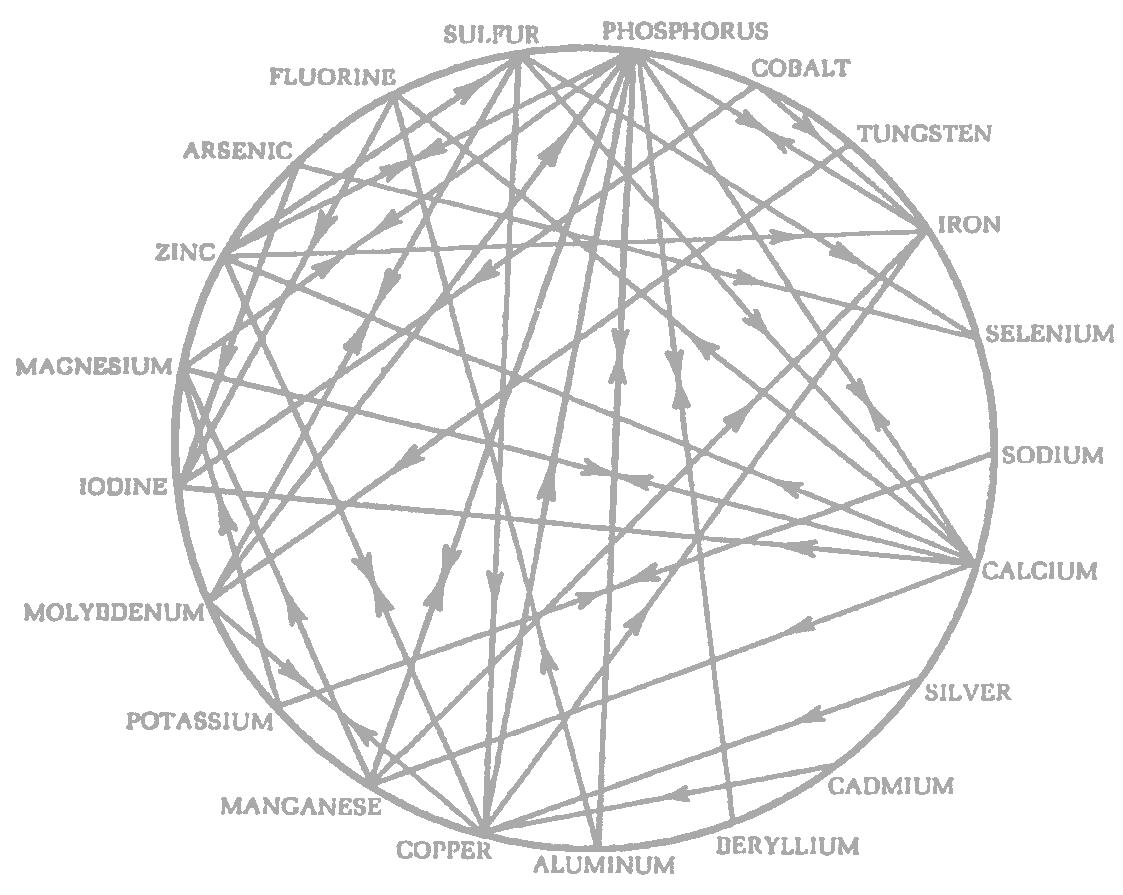
Free Choice Minerals - Equine Solutions Catalog Page 3

Free Choice Minerals
GMO-Free and ORGANIC Equine Free Choice
products Available
In their natural state, wild animals instinctively seek the food nutrients they need from a wide variety of natural sources. Domesticated animals today are restricted to small pastures, lots, stalls and buildings. The availability of natural sources for minerals and vitamins dwindles in relation to the degree of confinement.
Advanced Biological Concepts provides many nutritional solutions for confined and semi-confined horses by offering the Free Choice Stress System, A.B.C.'s Complete Diagnostic Free Choice System and the Free Choice Box Stall Kit (described on the following pages). Natural minerals are provided in separate compartments. They are natural in composition and in taste, with no additives. Horses can choose their minerals and vitamins by instinct and taste alone, as they always have.
Mineral Interrelationships in Animals

ELEMENT for PURPOSE
Take Me To The Minerals Products... ![]()
Frequently Asked Questions -
Q. Why are my horses going through so much A-Mix (364) and BVC Mix (732)? Can they overdose?
A. Consumption of minerals will be high without ABC's Plus (762). Horses tend to go rhrough a lot of the Free Choice
Vitamins
and Minerals especially the A-Mix and BVC Mix when our program is first introduced. Other indications include:
change
in weather (heat wave or cold snap), feeding older feed stuffs (hay or grain), when grass/pasture is lush and high
in nitrates,
hay quality, ubadequate sunlight, inclement weather, animal is under stress (internal or external), poor water
quality, injuries,
or parasites. Horses will only take as much as they need. If their bodies are not deficient, they will not touch
the
free choice vitamins and minerals.
Dietary mineral
From Wikipedia, the free encyclopedia
Dietary minerals are the chemical elements required by living organisms, other than the four elements carbon, hydrogen,
nitrogen, and oxygen present in common organic molecules. The term "mineral" is archaic, since the intent
of the definition is to describe ions, not chemical compounds or actual minerals.
Dietitians may recommend that minerals are best supplied by ingesting specific foods rich with the element(s) of
interest. Sometimes minerals are ingested as mineral dietary supplements, the most common being iodine in iodized
salt.
The dietary focus on minerals derives from an interest in supporting biochemical reactions with the required elemental
components.[1] Appropriate intake levels of certain chemical elements are thus required to maintain optimal health.
According to nutritional experts, the requirements are met simply with a conventional balanced diet.[citation needed]
Contents [hide]
1 Essential minerals
2 Unproven essential minerals
3 See also
4 External links
5 References
[edit] Essential minerals
Seventeen minerals are required to support human biochemical processes by playing roles in cell structure and function
as well as electrolytes:[2]
Calcium is needed for muscle, heart and digestive system health, builds bone, neutralizes acidity, supports synthesis
and function of blood cells. Dietary sources of calcium include dairy products, calcium-fortified foods, canned
fish with bones (salmon, sardines), and green leafy vegetables.
Chloride is needed for production of hydrochloric acid in the stomach and in cellular pump functions. Table salt
is the main dietary source of chloride.
Cobalt - vitamin B12. See pernicious anemia.
Copper is required component of many redox enzymes, including cytochrome c oxidase.
Fluorine participates in formation of tooth enamel which contains fluoroapatite. See also water fluoridation.
Iodine is required for the biosynthesis of thyroxine. See also Iodine deficiency.
Iron is required for many proteins and enzymes, notably hemoglobin. Dietary sources include red meat, leafy green
vegetables, fish (tuna, salmon), eggs, dried fruits, beans, whole grains, and enriched grains. See also iron deficiency
(medicine).
Magnesium is required for processing ATP and for bones. Dietary sources include nuts, soy beans, and cocoa. See
also magnesium deficiency (medicine).
Manganese is a cofactor in enzyme functions.
Molybdenum - xanthine oxidase and related oxidases.
Nickel - urease
Phosphorus is a component of bones (see apatite) and energy processing and many other functions.[3]
Potassium is a systemic electrolyte and is essential in coregulating ATP with sodium. Dietary sources include legumes,
potato skin, tomatoes, and bananas.
Selenium, a cofactor essential to activity of antioxidant enzymes like glutathione peroxidase.
Sodium is a systemic electrolyte and is essential in coregulating ATP with potassium. Dietary sources include table
salt (sodium chloride, the main source), sea vegetables, milk, and spinach.
Sulfur - cysteine and methionine
Zinc is pervasive and required for several enzymes such as carboxypeptidase, liver alcohol dehydrogenase, and carbonic
anhydrase.
[edit] Unproven essential minerals
Many elements have been suggested as essential, but such claims have usually not been confirmed. Definitive evidence
for efficacy comes from the characterization of a biomolecule containing the element with an identifiable and testable
function. One problem with identifying efficacy is that some elements are innocuous at low concentrations and are
pervasive, so proof of efficacy is lacking because deficiencies are difficult to reproduce.[1]
Arsenic, boron, bromine, cadmium, silicon, tungsten, and vanadium have established, albeit specialized, biochemical
roles as structural or functional cofactors in other organisms. These elements appear not to be utilized by humans.[citation
needed] Of the many trace minerals still lacking proof, chromium is implicated in sugar metabolism in humans, leading
to a market for the supplement, chromium picolinate, but definitive biochemical evidence for a physiological function
is lacking.[4]
[edit] See also
Macronutrient
Essential nutrient
Micronutrient deficiency
Health food
[edit] External links
Metals in Nutrition
The Minerals in Your Food
[edit] References
^ a b Lippard, Stephen J.; Jeremy M. Berg (1994). Principles of Bioinorganic Chemistry. Mill Valley, CA: University
Science Books, 411. ISBN 0935702725.
^ Nelson, David L.; Michael M. Cox (2000-02-15). Lehninger Principles of Biochemistry, Third Edition, 3 Har/Com,
W. H. Freeman, 1200. ISBN 1572599316.
^ Corbridge, D. E. C. (1995-02-01). Phosphorus: An Outline of Its Chemistry, Biochemistry, and Technology, 5th,
Amsterdam: Elsevier Science Pub Co, 1220. ISBN 0444893075.
^ Stearns DM (2000). "Is chromium a trace essential metal?". Biofactors 11 (3): 149–62. PMID 10875302.
Use the Navigation Bar for quick and easy access.

You can contact us by Snail Mail at: